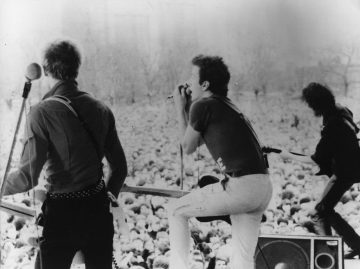
Alexander Billet in Jacobin:
Since the death of front-man Joe Strummer in 2002, the Clash have ascended into rock-and-roll mythos. No fewer than thirty books have been released on the band or on Strummer. Some of them are wonderful. Others are shallow and sloppy hagiographies. Their music has been used to hawk everything from boots to smartphones. Centrists in progressive clothing like Beto O’Rourke receive high praise for quoting “The Clampdown”to Ted Cruz. Separating what’s commodity and spectacle from the band’s actual contribution is getting harder.
The latest in the growing list of biographical material is “Stay Free: The Story of the Clash.” Produced by Spotify in collaboration with the BBC and narrated by Public Enemy’s Chuck D, it’s the first podcast dedicated to the band’s history. It is an excellent piece of work, both in terms of substance and style. Social and cultural context play a prominent role in telling the story of the band’s evolution. Strikes, riots, movements, political explosions and implosions clearly inform their philosophy and musical practices as global capitalism reconstitutes itself in the 1970s and 1980s.
All of which highlight the significance of the Clash’s musical experiments: the ever-expanding incorporation of reggae, hip-hop, and funk into their punk palette; their insistence on selling double and even triple albums at single album prices, much to the chagrin of their record label.
More here.
